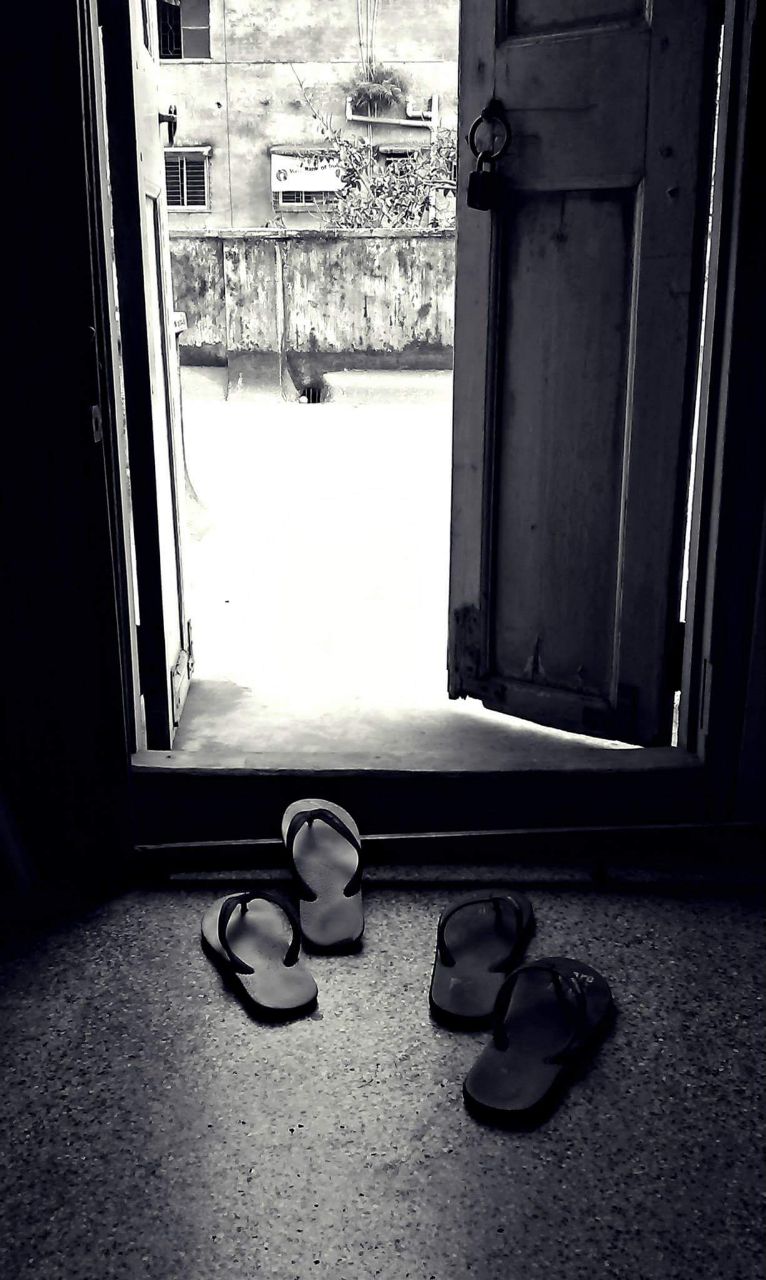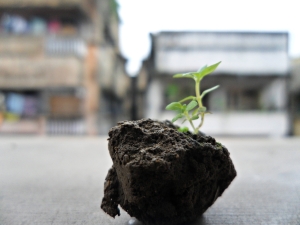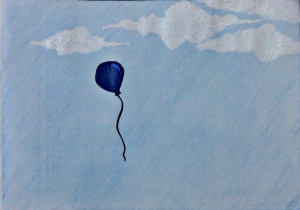None dared make a noise. Brother and sister sat quietly at the table, gulping down in fistfuls the pish-pash of rice and dal in front of them. The tubelight that illuminated — a charitable choice of word — the dining table reflected the pensive mood at dinner perfectly, its two blackened corners eating into the ever-dimming light. To their right, they could hear their grandmother tiptoeing around the kitchen; behind them, sounds floated in of the neighbour watching daily soaps on TV while she coaxed her son to finish his maths homework. To their left was a closed door behind which lay salvation. As for the noises, occasionally raised voices and odd clatter and crash floating down from upstairs were concerned, both siblings tried their best to turn a deaf ear to them. But their seeming nonchalance at this commotion was belied by their quickening pace of swallowing down the dinner, which, by now, had lost all taste. Meals done, plates duly deposited in the kitchen, they slunk away behind that closed door where an old man sat clipping articles from the day’s newspaper.
The door firmly shut behind them, they clambered onto the single bed and proceeded to make themselves comfortable, grabbing a kolbalish each. In the blink of an eye, two wizened palms with tiny portions — no serving could ever be enough — of hojmiguli in each were stretched out before them. The disappointment and the pent-up anxiety of the meal slowly abating, the little girl waited for Dadu to resume his place on the reclining chair in the corner of the room for her favourite part of the day to begin. Her brother sometimes got impatient or started fidgeting, begging for more hojmiguli, complaining about school, but she was content to let his whining and Dadu’s reassuring tones wash over her even if it meant delaying storytime. This, after all, was the only time of the day she needn’t hold her breath as she let the summer breeze from the three open windows wash over her.
This was the only room in the house with yellow walls, which brightened up the sanitised white glow of the tubelight. The windows were rarely ever shut and even on the hottest of summer days, Dadu’s room was the only respite from the claustrophobia of the house. One of the windows had a largish neem tree just outside, filling the room with an earthy smell in summer. This competed with the smell of dust and old books which were stacked on every available surface area — chairs, tables, tops of cupboards, glass showcases embedded in the walls, everything was overflowing with books, old cassettes, medicine samples, newspapers and magazines. A swift nudge on her ribcage from her brother’s elbow indicated that storytime had begun.
These were no ordinary stories of princes and dragons and fairytales where everyone lived happily ever after. Neither sibling believed in those — the growing noises from upstairs that broke into this oasis from time to time had ensured that. Dadu’s stories were always real, of people who didn’t mean much to the children, but who were clearly important if the glow in Dadu’s eyes when he spun his tales was anything to go by.
Today’s story was about a soldier called Field Marshal Manekshaw, whose nephew once needed his tonsils taken out. Dadu — once a revered surgeon in the city — had taken the boy under his care, oblivious to what would soon come his way. The day before the surgery, on his way to the Calcutta Medical College and Hospital, Dadu’s light blue ambassador was stopped by some men in fatigues before it could take the turn towards the hospital. Flummoxed, he stepped out and asked the reason for the road closure. It was closed off for a convoy, he was told. However, on explaining that he had surgeries and patients to attend to, he was allowed to pass — with a crisp salute, no less, Dadu beamingly informed us.
At this point, the reverie was shattered by the sound of breaking glass outside and Dida rushing into the room and locking the door behind her, shutting out her raging alcoholic son and his threats. Dida brushed off the concern from her face and settled in beside the girl, knowing all too well that this room was always safe. The children could sniff the anger in the air, but Dadu’s eyes did not reflect anger — it was something else she couldn’t quite put a finger on. The ranting continued outside, but at the sight of two troubled faces staring back at him, Dadu forced himself to go on and the little girl snuggled into the soft folds of Dida’s aged cotton saree which always smelt of Nivea cold cream.
On reaching the hospital things grew curiouser and curiouser. Before he could set foot into the ward for his rounds, the superintendent’s peon corralled him away to the boss’s chambers. Once there, Dadu was asked for a detailed report on his young patient and informed that rounds were off for today as he would have to attend to a very special visitor. Still befuddled at how that day was turning out to be, Dadu headed to his young patient’s bedside, only to run squarely into the broadest and most erect of backs. Here was that name again — Manekshaw. She kept saying that name in her head as the noise outside receded and the first stirrings of sleep beckoned her. Dadu’s praises of this man wouldn’t stop — how polite he was, how courteous, how respectful. She could see that the name meant something to her brother, who was asking questions and memorising details, apparently to brag about at school the next day. The words of the story began to blur as she drifted in and out of sleep, the one question teased the edges of her brain: could there ever be a man braver than Dadu, he who kept the dragon from the door?
Years later, as she stood at the threshold of Dadu’s room — Dadu, Dida and Dada had all passed away by this point — she knew both the man Dadu had told her about that night and the look she had seen in his eyes. It wasn’t anger — she had been right. It was a sense of failure, of impotence. He was no longer the doctor whom Field Marshal Manekshaw came to see, he was powerless even to protect his grandchildren from his son. She wished she had recognised it then so that she could tell the old man that in that oasis of his room, to her mind, he had been the most powerful man in the world, even when she didn’t know who Manekshaw was.







